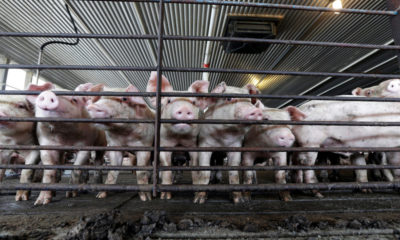
The first-ever report on the world’s coral reefs presents a grim picture, as losses mount due to global warming. But there are signs of hope — some regions are having coral growth, and researchers found that corals can recover if given a decade of reprieve from hot water.
-
Opinion
From Homes to Cars, It’s Now Time to Electrify Everything
The key to shifting away from fossil fuels is for consumers to begin replacing their home appliances, heating systems, and cars with electric versions powered by clean electricity. The challenges are daunting, but the politics will change when the economic benefits are widely felt.
-
Opinion
Why the World’s Rich Nations Must Pay for Climate Damage
Damage from increasingly extreme weather events is falling especially hard on developing countries, even though they have done the least to contribute to climate change. At the upcoming UN climate talks, rich nations must begin to compensate them for their mounting losses.
-
Glasgow Conference
At Climate Summit, Can the World Move from Talk to Action?
Negotiators at the Glasgow climate conference will face a critical choice: Set firm emissions targets for 2030, or settle for goals of achieving “net zero” by 2050? The course they set could determine if we have a shot at avoiding the worst impacts of climate change.
Climate
As the Climate Bakes, Turkey Faces a Future Without Water
No nation in the Mediterranean region has been hit harder by climate change than Turkey. But as heat and drought increase, Turkey is doubling down on water-intensive agriculture and development and spurring a water-supply crisis that is expected to get much worse.
E360 Digest
-
Microplastics May Be Impacting the Climate, Study Finds
Tiny bits of plastic are swirling in the sky, and a new model suggests they could be subtly affecting the climate. More about Microplastics May Be Impacting the Climate, Study Finds →
-
Rising Arctic Temperatures Mean Migrating North No Longer Worth It for Many Species, Study Finds
As temperatures rise in northern regions, migrating species are seeing less benefit from heading north for the summer months, according to scientists who reviewed 25 recent studies. More about Rising Arctic Temperatures Mean Migrating North No Longer Worth It for Many Species, Study Finds →
-
Bitcoin Miners Resurrect Fossil Fuel Power Plant, Drawing Backlash From Environmentalists
A cryptocurrency-mining operation in central New York has reopened a shuttered fossil fuel power plant to power 15,300 computer servers used to unlock bitcoins, raising concerns among environmentalists, the Associated Press reports. More about Bitcoin Miners Resurrect Fossil Fuel Power Plant, Drawing Backlash From Environmentalists →
Never miss an article! Subscribe to the E360 Newsletter for weekly updates delivered to your inbox. Sign Up.

Food & Agriculture
Turning Hog Waste into Biogas: Green Solution or Greenwashing?
North Carolina’s industrial-scale hog farms have long been a major source of pollution. Smithfield Foods now plans to turn some hog waste into biogas, but critics say the project does nothing about the larger problem of waste being stored in lagoons and sprayed on fields.
-
Biodiversity
Ozone Pollution: An Insidious and Growing Threat to Biodiversity
Ground-level ozone has long been known to pose a threat to human health. Now, scientists are increasingly understanding how this pollutant damages plants and trees, setting off a cascade of impacts that harms everything from soil microbes, to insects, to wildlife.
-
Biodiversity
On the Klamath, Dam Removal May Come Too Late to Save the Salmon
The planned demolition of dams on the Klamath River was expected to help restore the beleaguered salmon on which Indigenous tribes depend. But after a record drought and wildfire this summer, many are worried the salmon could be all but gone before the dams come down.
-
Photo Essay
As Italy’s Glaciers Recede, a Stunning World of Ice Is Being Lost
Photographer Luigi Avantaggiato has trekked high into the Italian Alps to document the melting of some of the world’s most studied glaciers. His images track the glaciers’ increasingly rapid retreat and capture the stark beauty of a land in transition as the ice disappears.
2021 Yale Environment 360 Video Contest
The winners of our annual contest honoring the best short environmental films.
-
E360 Video Contest Winner
In Northeast India, Cement Plants Disrupt Forest and a Way of Life
-
E360 Video Contest
On South African Shores, Women Carry On a Harvest Once Denied
-
E360 Video Contest
A Vast South American Wilderness Is Under Siege From Illegal Mining

